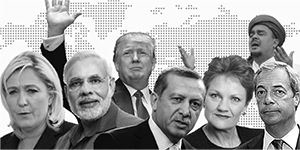
Adopting a global and comparative perspective, this course seeks to enhance understanding of the diverse forms of populism that have emerged throughout different historical periods and geographical locations, as well as their consequences for liberal understandings of democracy.
From India to the United States, from Turkey to Poland, it seems that we are currently witnessing a global populist trend with different local manifestations. As a result, populism has become a subject of intense debate, plagued by its negative and imprecise connotations. But what really is populism? Is this term relevant to understanding the apparent democratic discontent? Why and how does it emerge in very different historical, political and cultural contexts? How can support for populism be explained? Does populism represent a threat for democracy, or is it a healthy and necessary component of democratic debate? What are its implications? The course will try to answer such questions.
In this course, we will study populism from both conceptual and comparative perspectives. Given the highly contested nature of populism, during the initial weeks, this course will delve deeply into the history of populism, as well as explore various theories that shed light on its ideational, strategic, and performative dimensions. It will then move to explore the socio-cultural and economic conditions that facilitate the emergence of populism, the relation between populism and democracy and the relations among populism, political systems and popular movements. The last lectures will seek to apply the conceptual tools presented in the first part of the course to regional and country case studies.
From India to the United States, from Turkey to Poland, it seems that we are currently witnessing a global populist trend with different local manifestations. As a result, populism has become a subject of intense debate, plagued by its negative and imprecise connotations. But what really is populism? Is this term relevant to understanding the apparent democratic discontent? Why and how does it emerge in very different historical, political and cultural contexts? How can support for populism be explained? Does populism represent a threat for democracy, or is it a healthy and necessary component of democratic debate? What are its implications? The course will try to answer such questions.
In this course, we will study populism from both conceptual and comparative perspectives. Given the highly contested nature of populism, during the initial weeks, this course will delve deeply into the history of populism, as well as explore various theories that shed light on its ideational, strategic, and performative dimensions. It will then move to explore the socio-cultural and economic conditions that facilitate the emergence of populism, the relation between populism and democracy and the relations among populism, political systems and popular movements. The last lectures will seek to apply the conceptual tools presented in the first part of the course to regional and country case studies.
- 教師: Ozdemir Yonca